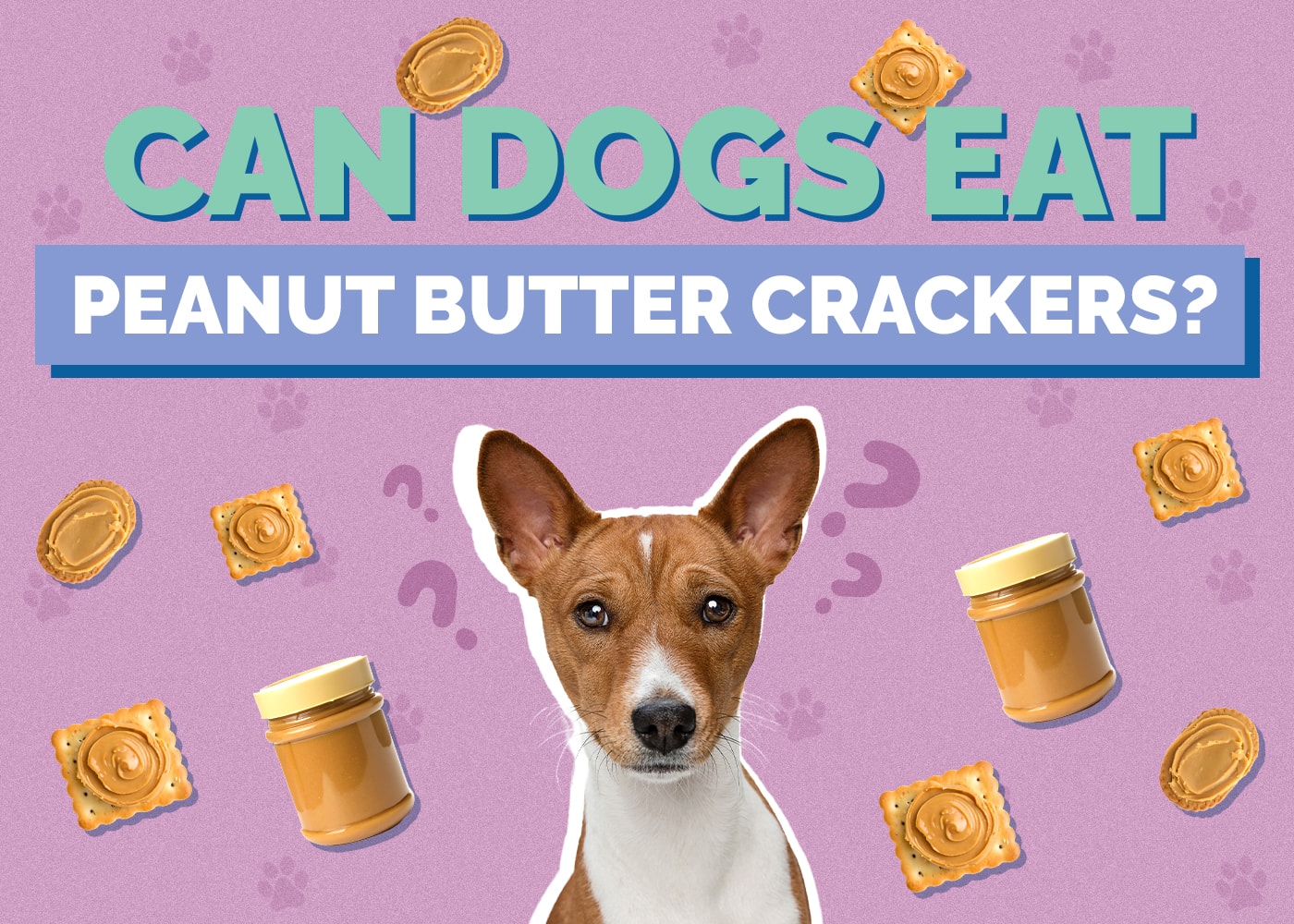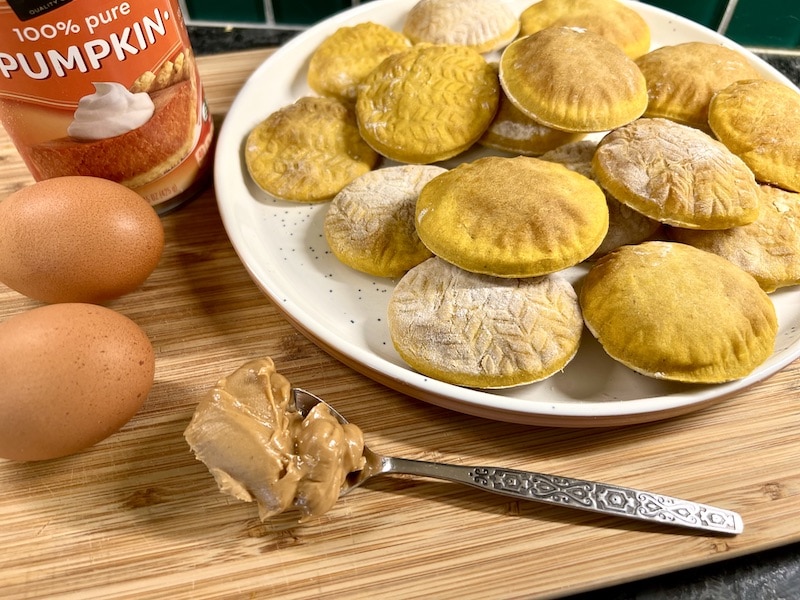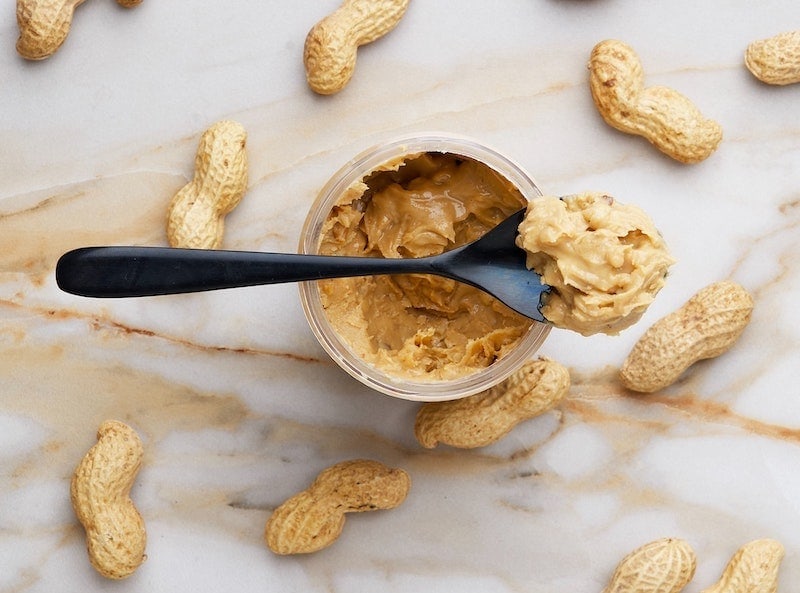Can Dogs Eat Peanut Butter Crackers? Vet-Reviewed Dietary Guidance
By Ashley Bates
Updated on

It’s no secret that dogs love the taste of peanut butter. It’s often a first choice to use for distributing medication or just for a lickable snack. But are peanut butter crackers safe for your dog? The answer depends on a few factors, but when it comes to peanut butter, you have to make sure it doesn’t contain xylitol, an artificial sweetener that is toxic for dogs.
There are a few types of peanut butter crackers. Some are made for humans, and some are made for our pets. If you are feeding your dog canine-friendly peanut butter crackers, this isn’t a problem. However, if you’re giving them human food, it’s not really the most advisable option. We’ll tell you why.
Dogs Can Eat Peanut Butter Crackers—For Dogs!
Peanut butter is a very nutritious food that dogs can eat with joy, but in moderation. Dogs can eat peanut butter crackers, but only ones made for dogs! Luckily, there are plenty of options both commercially and from scratch! However, we want to make you aware of a few things.
All peanut butter fed to dogs should be totally natural and processed as little as possible. That means it should contain no added sugars or excess oils. Beware of artificial sweeteners, such as xylitol, which is quite toxic for dogs, too.
So, if you plan to make your dog their very own peanut butter delights, shop smart!

Why Human Snacks Aren’t the Best Snacks
The reality is human snacks are made for just that—humans. Since they aren’t specially formulated for canines, it really isn’t the best dietary choice. Human snacks can be full of things like sodium, artificial flavors, dyes, and chemicals—none of which are good things for dogs to have in their system.
Anything that our pups need nutritionally, they get from their standard dog food diet. So when you’re adding in a snack of any kind, moderation is key, and human snacks should be out of the food bowl.
DIY Doggy Peanut Butter Cracker Recipe
There are laundry lists of peanut butter snacks you can whip up for your dog in your home. Here are a few really easy-to-make peanut butter crackers. Unless they contain flour, you may not even have to bake anything. Just mix up the ingredients and spread them on a dog-safe cracker treat. But offer the treats to your dog in moderation, not more than 10% of their total daily food intake, and less if they haven’t eaten them before. New treats or food can cause a stomach upset in some dogs.
However, if you are adding flour to the recipe, it’s advisable to bake the treats, as flour in powder form may be a respiratory irritant if inhaled by mistake and may lead to choking. Flour in raw form may also contain bacteria, and if you add any yeast to make dough, this 100% needs to be baked. Otherwise, raw dough can make your dog very sick, causing life-threatening bloat and alcohol poisoning.
And always avoid raw or undercooked eggs due to risk of Salmonella1 and other nasty bacteria.

Cookie Rookie Peanut Butter Dog Treats
These peanut butter treats are yummy and fun to make! Unlike some crunchy snacks, these come with a delicious peanut butter drizzle topping. You can use them for a few days if they are kept in the refrigerator, or can even be frozen and enjoyed later. Speak to your vet before considering adding new treats or ingredients to your dog’s food, as they may not be appropriate for all dogs, depending on their health and possible underlying illness, such as diabetes or food allergies. This recipe is not appropriate for dogs with grain (wheat) or dairy food allergy.
Treat Portion:
- 2 ½ cups whole wheat flour
- 1 large egg
- 1 cup water
- 2 tablespoons honey
Frosting:
- 2 tablespoons peanut butter
- 1 tablespoon honey
- 1/3 cup cornstarch
- 3-4 tablespoons hot water
Love from the Oven Peanut Butter Dog Treats
These treats make a perfect snack! With only a few ingredients, your pup can enjoy the peanut-buttery flavors they love so much. This creator makes a good point—always use peanut butter that doesn’t contain the artificial sweetener called xylitol, as it is toxic to dogs.
- 2 cups whole wheat flour
- ½ cup natural peanut butter
- 2 eggs
- ¼ cup water

Bigger Bolder Baking Peanut Butter Banana Dog Treats
If you want to go Elvis-style, you can make your dog yummy peanut butter and banana treats. We think they will love them and so will you! With three simple ingredients, you can give your dog a tasty snack they can’t wait to gobble up—not to mention it’s healthy!
- 1 cup plain yogurt
- ½ cup peanut butter
- 1 ripe banana
Pawesome Recipes Peanut Butter Almond Flour Dog Treats
Is your pup gluten-sensitive? Don’t worry! We covered all the pups with sensitive guts, too! This recipe uses three simple ingredients—and it’s totally gluten-free. You can buy almond flour at a local store and make your pup a yummy snack to make their tummy growl happily—not in misery.
- Almond flour
- Peanut butter
- Egg
Dogs + Peanut Butter Crackers: Final Thoughts
So now you know that even though dogs can’t eat human peanut butter crackers, they can still enjoy the snack in a doggy-approved recipe. Even if they are begging for your handful of scrumptious treats, human foods contain ingredients our canines simply shouldn’t have.
All you have to do is get a peanut butter dog treat from the store or whip up one of your own in your very own kitchen using xylitol-free peanut butter. Dogs love peanut butter, which can be very healthy in moderation.













